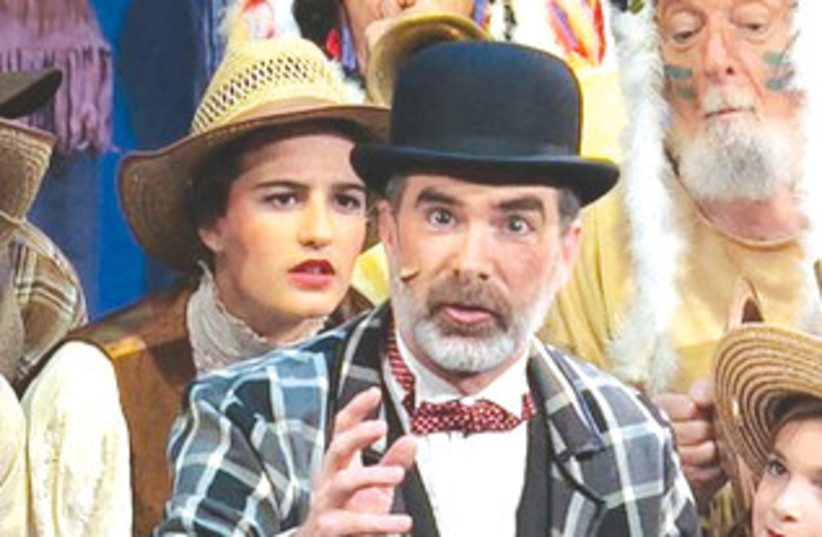Years ago I came across a joke book called something along the lines of You Don’t Have to Be Jewish to Enjoy a Jewish Joke But It Helps. By the same token, is it advisable to be Jewish to write a good musical number? Okay, that may be stretching the religious-cultural point a bit, but the sheer quantity of Jewish songwriters whose works made it into the Great American Songbook is striking.
That line of thought appears to be at the core of the Great American Songbook concert scheduled for May 30 (8 p.m.) at the Khan Theatre in Jerusalem. The yesteryear repertoire will be performed by Aviella Trapido, Hanan Leberman, Alona Cole, Guy Frati and Eric Guth. Frati – at 34, the youngest of the bunch – also serves as musical director.
The show blurb describes “a selection of great American hits from legendary composers, including Leonard Bernstein, Stephen Sondheim, Burt Bacharach, Lorenz Hart, Richard Rodgers and Oscar Hammerstein.” All were Jewish or of Jewish descent. Charts by iconic (non-Jewish) composer-lyricist Cole Porter are in the show mix too.
Guth – who doubles as producer of the Khan date – believes there are historical and logistical reasons for the Jewish propensity for songwriting and show business in general.
“There was a television documentary about Jews in the movies. They showed that the reason why Jews got into the movie business was because they owned live performance theaters at the turn of the [20th] century and into the 1920s. The problem anyone that does live performances has is getting reliable actors,” Guth explains.
They solved the problem by presenting celluloid that, once shot and in the can, was a done thing and required no more input from the thespians, reliable or otherwise.

First-generation American Jews helped build the Great American Songbook
Antisemitism, and the need for Jews to up stakes and move on at the drop of a hat also led to a tendency to engage in occupations that allowed for a transitory migratory lifestyle. Music answers that go-with-the-flow requirement.
“Jews used portable things, like in Fiddler on the Roof,” Guth says, referencing the closing scene when the Jews are forced by the Russian authorities to abandon their village.
“It was like being a musician or a lawyer, anything that Jews went into was all very portable. They didn’t have infrastructure that they had to drag around with them.”
And so, eventually, the Great American Songbook came to be enriched by a slew of numbers written by first-generation American Jews, such as George and Ira Gershwin.
All of that, and much more, appealed to the 66-year-old American-born producer-vocalist who certainly has the personal collateral for his part in next week’s musical undertaking.
“I have always loved singing, and I come from a family of musicians,” Guth explains.
“My great uncle Bill used to run a big singing and voice school in Southern California. My twin brother teaches piano, bagpipes, and voice. He and his wife direct a chorus with 100 women, in the United States.”
After making aliyah in 2000, Guth decided to keep his musical ball rolling, taking an occasional part in productions put on by the Jerusalem-based Encore Educational Theater Company. That eventually begot the current project.
“While I was acting with Encore, I discovered that there are people in Jerusalem who, just like me, grew up listening to the American Songbook songs,” Guth notes.
“When they hear these songs, they get taken back in time to important memories in their lives. It is a special connection we have with these songs.”
Guth and his pals want to have fun on the Khan stage, spread the American musical word to the public and leave the patrons with a song or two in their hearts – and possibly, merrily humming an air at the end of the show, and a little better informed about how all this enduringly popular music came to be.
“In Jerusalem, we have our own version of the Great American Songbook,” says the bass-baritone.
“It’s a production where we perform these amazing American songs and also share some interesting stories and facts about the songs and the people who wrote them. Even if you grew up listening to these songs, you might not have known their origins or how they were created. Our goal is to make sure our audience leaves our performance with happy memories and a tune on their lips as they go home.”
Sounds good.
For tickets and more information: (02) 360-3600 and www.americansongbook.info/
